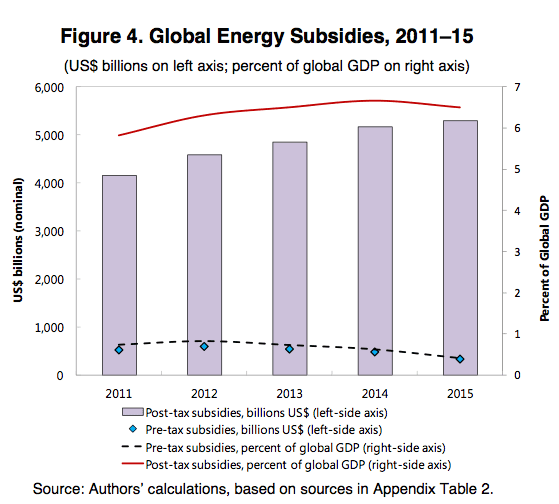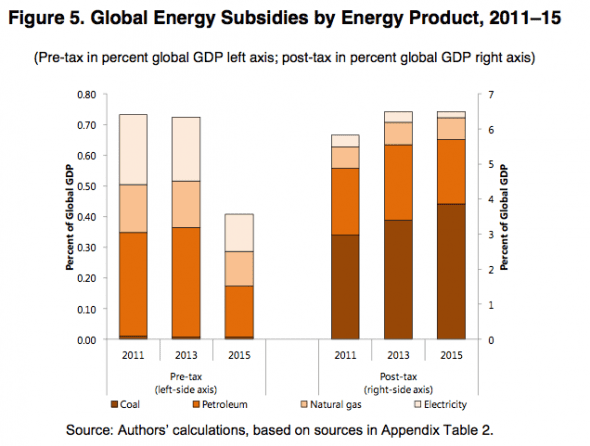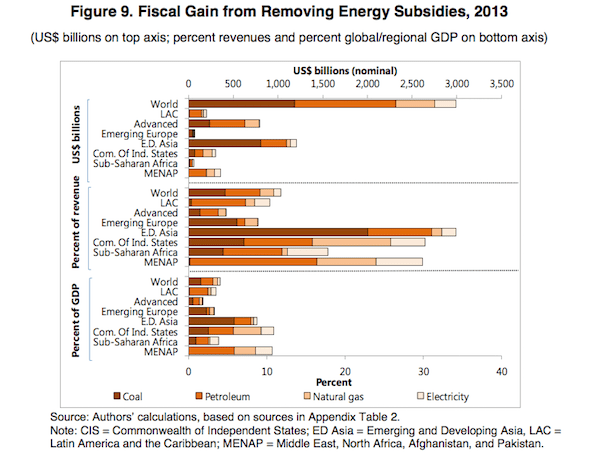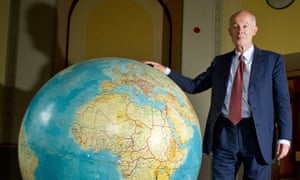Fossil fuels subsidies cost world $5.3 trillion a year –
$10m a minute
The eye-watering figure, based on calculations the IMF describes as “extremely robust,” is more than double the projected 2014 estimate the IMF released around this time last year, and amounts to more than the total health spending of all the world’s governments.
It is somewhat of an irony, then, that the IMF’s new figure of $5.3 trillion is largely attributed to polluters not paying the costs – social welfare, health, environmental and broader economic – imposed on governments for the burning of coal, oil and gas.

“Post-tax energy subsidies are dramatically higher than previously estimated — $4.9 trillion (6.5 per cent of global GDP) in 2013, and projected to reach $5.3 trillion (6.5 per cent of global GDP) in 2015,” the report says.
But according to eminent UK economist Nicholas Stern, even this “vast” figure amounts to a significant underestimate.
“A more complete estimate of the costs due to climate change would show the implicit subsidies for fossil fuels are much bigger even than this report suggests,” he said in a statement on Monday.
Unsurprisingly, coal is named as the biggest recipient of the subsidisation, “given its high environmental damage and because (unlike for road fuels) no country imposes meaningful excises on its consumption,” the report says.

Petroleum is the next most heavily subsidised product, the report notes, with the projected subsidy remaining at 1.8 per cent of global GDP in 2015 despite declining petroleum prices.
This is followed by natural gas, and then by electricity, for which the projected post-tax subsidy comes to 0.2 per cent of global GDP in 2015, with environmental impacts attributed to energy inputs rather than power generation itself.
The report also finds that post-tax subsidies are large and pervasive in both advanced and developing economies, but are “especially large (about 13-18 per cent) relative to GDP in emerging and developing countries.
“There is no justification for these enormous subsidies for fossil fuels, which distort markets and damages economies, particularly in poorer countries,” said Lord Stern.
In Australia, a report published in December estimated that the nation’s fossil fuel sector was set to receive $47 billion in federal government subsidies over the next four years.
In a statement to the Senate inquiry into wind turbines on Tuesday, Director of research at The Australia Institute, Rod Campbell, stressed that every dollar from treasury to the fossil fuel industry was one not being spent on schools, hospitals or public infrastructure.
“We know that over a six-year period, state governments in Australia spent $17.6 billion supporting the mineral and fossil fuel industries. Enough to fully fund the Gonski education reforms,” Campbell said.
“We know that the diesel fuel rebate (fuel tax credit) costs $6.2 billion a year. (2015 Federal Budget Paper 1, Statement 5)
“We know that Galilee coal projects, including Abbot Point terminal, cost Queensland taxpayers $2 billion.
“The old, false story of ‘cheap’ fossil fuels is bunk. In addition to the health and climate costs that are never accounted for, they’re very directly costing taxpayers billions,” Campbell said.
The good news – there is some – is that “the fiscal, environmental, and welfare impacts of energy subsidy reform are potentially enormous,” says the report.

The IMF estimates that eliminating subsidies for fossil fuels would cut global carbon emissions by 20 per cent; slash the number of premature deaths from outdoor air pollution by 55 per cent (about 1.6 million lives a year) and deliver projected economic gains of around $2.9 trillion in 2015 – an amount that could be an economic “game-changer” for many countries, the report says.

“What really matters for policy – not only for its own sake, but also for convincing policymakers and stakeholders of the need for reform – are the benefits that reform will produce in terms of fiscal balances, the environment, human health, and the economy,” the report says.
Another consequence, as the Guardian has noted here, would be that the need for subsidies for renewable energy – a relatively tiny $120 billion a year – would also disappear, if fossil fuel prices reflected the true cost of their impacts.
“If we get the pricing of fossil fuels right, the argument for subsidies for renewable energy will disappear,” said David Coady, the IMF official in charge of the report.
“Renewable energy would all of a sudden become a much more attractive option.”
From Reneweconomy @ http://reneweconomy.com.au/2015/fossil-fuels-subsidies-cost-world-5-3-trillion-a-year-10m-a-minute-27983
Fossil fuel industry must 'implode' to avoid climate disaster, says top scientist
‘The age of carbon is
over’ and a transition to a greener economy is inevitable, says Hans Joachim
Schellnhuber, adviser to the German government and Pope Francis

An “induced implosion” of the fossil fuel industry must take place for there to be any chance of avoiding dangerous global warming, according to one of the world’s most influential climate scientists.
Professor Hans Joachim Schellnhuber, an adviser to the German government and Pope Francis, said on Friday: “In the end it is a moral decision. Do you want to be part of the generation that screwed up the planet for the next 1,000 years? I don’t think we should make that decision.”
Schellnhuber was speaking at a major science conference in Paris, taking place before a crunch UN summit in December, also in the city, at which nations must seal a deal on global warming. World leaders were sent a stark message in the communique issued by the conference, which warned that the opportunity to avoid disaster is rapidly diminishing.
Laurence Tubiana, France’s climate change ambassador, said the aim of the UN summit is to send a signal that the transition from coal, oil and gas to a low-carbon economy is inevitable. If the aim is achieved, Tubiana told the Guardian, “you will see a massive acceleration [to a greener economy], particularly on the investment side in the next five years”.
The conference was addressed by Nobel prize-winning economist Joseph Stiglitz, who said the fossil fuel industry faced big challenges: “A mixture of many different changes going on – consumption patterns, civil society, political action – will be disruptive to the carbon economy.”
Stiglitz, Schellnhuber and Tubiana all expressed support for the global divestment campaign, which lobbies investors to sell their stocks in the biggest fossil fuel companies. “I fully support the divestment movement,” said Schellnhuber. “Do you want to be part of an economy that is destroying the world, or part of an economy that protects creation?”
Tubiana said the recent call by major European oil and gas companies for a price to be put on carbon pollution was partly the result of the “very important” divestment movement. She said: “Oil companies are like canaries in the mine. When there is no danger they are silent, but when they feel danger and opportunity they make a move.”
The Guardian is divesting from fossil fuels and is campaigning for the world’s biggest health charities, the Bill & Melinda Gates Foundation and the Wellcome Trust, to do the same.
The Paris conference was attended by more than 2,000 scientists from 100 countries. Schellnhuber told the delegates: “In order to stay below 2C (3.6F) [the internationally agreed limit for global warming], or even 3C, we need to have something really disruptive, which I would call an induced implosion of the carbon economy over the next 20-30 years. Otherwise we have no chance of avoiding dangerous, perhaps disastrous, climate change.”
To achieve these outcomes, Schellnhuber said: “We need a global social movement and it is already happening.” He said the best analogy for the transition from dirty to clean energy was the abolition of slavery, which was fundamentally driven by ethical concerns.
The scientists’ communique said that tackling climate change is economically affordable, but that nations “waiting on the sidelines” will cause the costs to rise. It said global warming is already inflicting damage across the globe and that failing to act will lock in the dangers.
Stiglitz backed the affordability of tackling climate change: “Creating a green economy is not only consistent with economic growth, it can promote economic growth,” especially when there is a lack of demand in the global economy.
He said the best option for an enforceable climate deal was for willing countries to introduce carbon taxes and then penalise nations refusing to do the same with border taxes on their exported goods.
A voluntary agreement could not solve the climate crisis, he said: “The atmosphere is a public good – all want to get the benefits, but no one wants to pay the cost.” He also dismissed carbon markets as being too prone to political lobbying: “It is basically giving away money.”
Stiglitz said it was unsurprising that a carbon price has proven hard to implement on a worldwide scale. “If you own fossil fuel assets, and the impact of any global agreement on climate change is going to push their value down, you are going to resist, using whatever tactics. But the interests of global society have to overcome these narrow special interests.”
From The Guardian
@ http://www.theguardian.com/environment/2015/jul/10/fossil-fuel-industry-must-implode-to-avoid-climate-disaster-says-top-scientist?CMP=share_btn_fb
For more information about fossil fools see http://nexusilluminati.blogspot.com/search/label/fossil%20fuels
- Scroll down
through ‘Older Posts’ at the end of each section
Hope you like this
not for profit site -
It takes hours of work every day by
a genuinely incapacitated invalid to maintain, write, edit, research,
illustrate and publish this website from a tiny cabin in a remote forest
Like what we do? Please give anything
you can -
Contribute any amount and receive at
least one New Illuminati eBook!
(You can use a card
securely if you don’t use Paypal)
Please click below -
Spare Bitcoin
change?
For further enlightening
information enter a word or phrase into the random synchronistic search box @
the top left of http://nexusilluminati.blogspot.com
And see
New Illuminati – http://nexusilluminati.blogspot.com
New Illuminati on Facebook - https://www.facebook.com/the.new.illuminati
New Illuminati Youtube Channel - https://www.youtube.com/user/newilluminati/playlists
New Illuminati’s OWN Youtube Videos
-
New Illuminati on Google+ @ For
New Illuminati posts - https://plus.google.com/u/0/+RamAyana0/posts
New Illuminati on Twitter @ www.twitter.com/new_illuminati
New Illuminations –Art(icles) by
R. Ayana @ http://newilluminations.blogspot.com
The Her(m)etic Hermit - http://hermetic.blog.com
DISGRUNTLED SITE ADMINS PLEASE NOTE –
We provide a live link to your original material on your site (and
links via social networking services) - which raises your ranking on search
engines and helps spread your info further!
This site is published under Creative Commons (Attribution) CopyRIGHT
(unless an individual article or other item is declared otherwise by the copyright
holder). Reproduction for non-profit use is permitted
& encouraged - if you give attribution to the work & author and include
all links in the original (along with this or a similar notice).
Feel free to make non-commercial hard (printed) or software copies or
mirror sites - you never know how long something will stay glued to the web –
but remember attribution!
If you like what you see, please send a donation (no amount is too
small or too large) or leave a comment – and thanks for reading this far…
Live long and prosper! Together we can create the best of all possible
worlds…
From the New Illuminati – http://nexusilluminati.blogspot.com

There is absolutely no incentive for the oil cartels to change as huge profits continue to come in for them and their many thousands of associates. The only change will come when huge numbers of people begin to get rid of their automobiles in favor of bicycles. Good luck... Just too many motor heads out there that absolutely love driving their cars, I being one of them. Global warming is as natural as global cooling. There's lot's of misinformation out there about how we're screwing up the earth, and yet we're part of the earth are we not? People often look at a forest fire as being so incredibly devastating on an ecosystem, but factually fires are needed to clean up the underbrush as new sprouts have more sunlight to flourish. Every so called environmental destructive force can be looked at as being a positive thing, with knowledge of how energy transforms itself.
ReplyDeleteNot so. Various 'free' fuels and electrical technologies exist and have been ruthlessly suppressed by the cartels. Even without these farsighted technologies, many techniques exist now that are superior to using fossil fuels in all respects. See http://nexusilluminati.blogspot.com/search/label/suppressed%20technology - and see 'older posts' at the end of each section
DeleteYes, FREE ENERGY EXISTS! My point is, if there continues to be a demand for the current energy fuels, then WTF, nothing will change. Alternatives are being suppressed because we demand the current fuels. STOP DEMANDING and watch as we have a chance to utilize all that we know about alternatives. We are the cartels, Illuminator, for we are the ones who use these fuels, do we not? I think we're all a bunch of stupid hypocrites. The computer you're using is petrol based, the Subaru your dad drove into his house, the garbage bags you use, any electricity you may use is all a part of the perceived problem, right? How do 7 billion people make the switch from city life to country living without oil under the rules of price system operations?
ReplyDeleteEveryone is free to source clean energy if they want to today. Computers can just as easily be produced from bioplastics derived from hemp (for instance - and btw, we drive no Suburu or 'modern' vehicle). Half of that 7 billion already live outside cities and towns. The other half were only recently urbanised and brainwashed to make fool fuel (dumb unskilled labour) for factory and office owners. Most would prefer to live cleanly (and freely) if given the choice and chance.
DeleteI could make a strong argument that OIL is a free energy, but us being the SUCKERS we are are willing to pay a price for it with our lives. We're not too bright are we, Illuminator?
ReplyDelete